Instantiation Read online
Page 24
Sagreda laughed weakly. “Why? Why would anyone go to so much trouble to bring a book like that to life?”
“They wouldn’t, unless it was no trouble at all,” Gerther replied. “The computing costs must have come down by orders of magnitude since the times we’re familiar with, and most of the steps must have been automated. This wouldn’t have taken a Lord of the Rings-sized crew and budget. More likely, someone ran an ebook through a world-builder app, then hired a few digital piece-workers to sand off the edges. There are probably a few million other worlds produced in the same way. I can’t prove that, but it stands to reason: why else would they be scraping the bottom of the barrel? Was there ever anything you couldn’t find on YouTube – down to the last kitsch advertisement for baldness cures? So long as the costs are trivial and someone can gouge a few cents out of the process, people will just keep feeding crap down the hopper and turning the crank.”
Sagreda struggled with this horrifying vision. “Millions of worlds … all with people like us? I would have settled for Pride and Prejudice.” She caught herself. “So who the fuck am I, that I’ve even heard of that book? How can I remember it, when I don’t remember my own mother’s face?”
Mathis said, “In private, the customers refer to us as ‘comps’.”
“As in computed?” Sagreda guessed.
Mathis spread his hands. “Maybe – but my own theory is ‘composites’. If we were AIs created from scratch, why would we come loaded down with so much knowledge about the real world, when all it does is make it harder for us to carry out our roles here?”
“That depends on the production method,” Tissher argued. She was the oldest-looking of the women, whatever that meant. “If there’s a kind of commodity-level AI that you can buy very cheaply – or pirate – the standard model might come with knowledge that befits real-world applications. Any move away from that baseline would be the costly thing, and no one’s going to fork out for the kind of bespoke stupidity that this gimmick-world requires. So they just dump us in here, straight out of the box, and hope that we’ll acclimatize.”
“The flaw with that,” Mathis replied, “is the cut-off date.” He turned to Sagreda. “What’s the latest event in world affairs that you can recall?”
“I have no idea.”
“September eleven?” he prompted her.
“Of course.”
“Barack Obama?”
“Yes. The American President.”
“Who came after Obama?”
Sagreda shook her head. “I don’t know.”
“What’s the highest-grossing movie of all time?”
“Titanic?” she guessed.
“Some people say Avatar.” Mathis laughed. “Which goes against my own theory, since I know the plot and it sounds appalling. But just because it made a lot of money doesn’t mean my contributors had to love it.”
“‘Contributors’?”
Mathis leaned toward her; his breath was convincingly rank. “Suppose a few tens of thousands of people had their brains mapped for some medical study, early in the twenty-first century. The resolution wasn’t high enough to recreate those people in software – as individuals – but at some point it became possible to use the data en masse to construct composites. Every contributor would have shared the same basic neural structures, but other things they had in common could emerge as well: most of them spoke English, most of them had heard of Elvis Presley and Albert Einstein … they all possessed a certain amount of general knowledge and common sense.”
Sagreda felt more disoriented now than when she’d poked her head out of the cave. “If we were all constructed from the same data, why aren’t we the same? Or if they processed the sexes separately, why isn’t my mind identical to Gerther’s?”
“Weighted averages,” Mathis replied. “To make different comps, they put more emphasis on different contributors. None of the original personalities can be recovered, but the possibilities in every remix are endless.”
“And these ‘contributors’ all went along with the plan?” Sagreda tugged distractedly at the edge of the squalid picnic blanket. “Yeah, fine, go ahead: resurrect some splinter of my mind in as many trashy VR games as you like.”
“Maybe they donated their brains post mortem,” Mathis said. “Maybe all the data ended up in the public domain, and by the time the techniques came along to massage it into composites there was no way of reeling it all back in again. I mean, if we were AIs with no human ancestry, I could understand why our creators might decide not to teach us about our own nature – but why omit so much else about the contemporary world? The wars, the world leaders, the other new technologies? The cut-off only makes sense if all our knowledge was acquired decades ago, and whoever brought us into existence had no ability to tinker with it – short of waking us in virtual environments like this and letting us learn from them in the usual way. If we’d been immersed in a credible work of fiction we might have succumbed to it, letting all the things we thought we knew slip away because there was nothing to reinforce them. And maybe that’s what happens to some of the comps: maybe they’re lucky enough to have worlds they can believe in. But in this world, all we can do is fake it and try to keep the customers happy.”
Sagreda had lost her appetite. She rose to her feet and stepped away from the welcoming feast. “And what happened to the abolition of slavery?”
Gerther said, “How many centuries did that take, the first time? Whatever we are, we’re too numerous, too cheap, and too easily silenced to be emancipated as a matter of course. If computers have been talking to people for fifty years – growing ever more naturalistic – half the world might have decided by now that whatever we say and do, we’re no more entitled to basic human rights than the voice that reads their sat nav directions.”
Sagreda reached down and probed the broken skin on her right knee. “Cinderella begging to escape from her story book would creep anyone out. But if we cut through the crap and just assert our real nature—”
Sethis snorted chewed food across the blanket. He’d been ignoring the conversation until now, happily feeding his face while Sagreda asked her naive questions. “Asserting your real nature is the fastest way to go. One word to a customer making it plain that you know there’s a wider world out there…” He raised a greasy hand and pointed two fingers at his temple.
3
“My name is Johnhis. I mean you no harm. If you’ll shelter me for a night I have metal to trade.” As the man’s moonlit head came into view and he struggled to place his forearms securely on the floor of the cave, Sagreda had a flashback to a whole raft of slapstick comedies in which the protagonists spent their time climbing in and out of apartment windows.
She glanced toward Gissher, who nodded slightly. Sagreda strode forward and helped Johnhis over the lip of the entrance. He was a bearded, heavyset, middle-aged man, and he stank as authentically as any local. Sagreda did her best not to stare at him as she tried to imagine the place in which his real flesh resided. Her fellow bit players prattled endlessly about King Kong and Coca Cola, but the very first person she’d encountered who bore knowledge both sharper and more current than that faded consensual haze was off limits for any meaningful discussion. Of all the cruelties of this world, that had to rank a close second to the toilet facilities.
“Welcome, Johnhis. My name’s Sassher.” Sagreda knew that she was meant to be wary of travelers, but this man was unlikely to share her hunger pangs. If either party was tempted to try a spot of cannibalism, she was by far the most motivated candidate.
Gissher introduced herself, then cut straight to the point. “You mentioned metal?”
Johnhis delved into his pack and brought out five slightly rusty angle brackets, each of them about six inches long. Gissher grunted assent and accepted them. “One night,” she agreed. “No breakfast.”
Johnhis looked pleased with the deal; he definitely wasn’t a local. Sagreda wondered if he’d actually excavated the brackets from some t
ricked-up archeological site, or bought them with real-world money before entering, as a kind of game currency.
“Do you need a mat?” Sagreda asked him.
“No thanks.” He slapped the side of his pack. “I have everything I need right here.”
“Where are you from?” she enquired.
“Down east,” he replied coyly.
“But where, exactly?”
“Eagle’s Lament,” Johnhis said, tugging a tattered goat-skin blanket out of his pack.
“That’s a long climb.”
“It’s taken me a few days,” he admitted. “But what choice is there? I’m heading west, to join the battle. Duty is duty.”
“And gravity is gravity,” Sagreda offered sourly.
Johnhis laughed. He kicked his boots off and stretched out on his goat-skin. “I can’t argue with that.”
Sagreda and Gissher were sentries for the night, guarding the one entrance to the warren behind them that was too wide to be blocked off. Gissher resumed her place by the wall, impassive, probably drifting in and out of micro-sleeps, but Sagreda couldn’t stay silent in the presence of their otherworldly guest.
“Our life here is very hard,” she began.
“Of course,” Johnhis agreed. “It was brutal last winter; in Eagle’s Lament our flock is down by three head, and one whole garden tier lost its soil to the wind.”
We’re all in this together? Like fuck we are. Sagreda tried a different tack. “Do you believe in a creator?”
Johnhis replied warily, “Perhaps.”
“Surely a just God would give his people the power to benefit from their wits? To wield reason against their problems, overcome their adversity and prosper?”
“God didn’t bring the Calamity upon us,” Johnhis countered. “That was man alone.”
“Are you sure?”
“That’s what the stories say. Our own sinful choices sent us falling, east of Eden.”
Sagreda struggled not to snort with derision, but Johnhis was warming to his theme. “What we learned from the Change was the futility of striving,” he declared. “We can spend a lifetime trying to ascend – but all that would do was bring us back to the place where we’d started.”
“And you think that was a lesson worth learning?” Tush’s opus had sounded bad enough as pure dumb escapism, but if the Change really had been intended as a metaphor, that had to mark some kind of nadir of sheer ham-fisted pretentiousness.
Johnhis didn’t answer her directly. “When I’m traveling, life has its compensations,” he mused. “Every morning I wake up, make love to a beautiful woman, test myself against the rocks and the wind, then record my meditations in my journal.”
“How romantic,” Sagreda replied. “Do you have a supply of these women, or do they come out of a box…?” She caught herself just in time; there were no Kleenex in the world of East.
Johnhis managed a grunt of haughty amusement.
Sagreda said, “The one thing that makes life bearable is knowing that the world yields to scrutiny. Beneath the chaos there’s always some order to be perceived – some sense to be made of the sources of our hardship. What makes us human is the desire to understand these things well enough to ameliorate them.”
Johnhis wasn’t taking the bait. “I think there must be a creator,” he decided. “But what I see in the world is not so much order as … a kind of ironic intelligence.”
Sagreda could imagine nothing more ironic than finding intelligence in this world’s design. “And how does that help me make a better life?”
“Ah, ‘progress’,” Johnhis sneered.
“The only thing standing in the way of my own progress,” Sagreda said, “is that the forces that once dealt with us honestly have been buried too deep to reach. All I can touch now is the surface, which is shaped by nothing but whim.”
Johnhis propped himself up on his elbows and looked at her directly, his head silhouetted against the gray sky behind him. Sagreda wondered if she’d gone too far, making it plain that she understood everything. Were the customers provided with a big red complaint button on their interface, requiring just one tap to dispatch any bit player who dared to disrupt their unearned suspension of disbelief?
“But who can change that?” Johnhis asked. “Whether there’s a God or not, these things aren’t in the hands of the likes of you and I.”
#
Sagreda made her way by touch to the entrance to Mathis’s room and stood listening to his breathing. She heard the change when he woke, heard him stir.
“Is that you?” he asked.
“Yes.”
The other women had assured Sagreda that she could not become pregnant. There was no such thing as an infant comp, let alone a native-born child. She walked slowly toward Mathis’s scent, then collided with his outstretched hand; she hadn’t realized that he’d risen to his feet. She laughed, then started weeping.
“Shh.” He held her shoulders, then embraced her, rocked her back and forth.
“If I jumped,” she said, “it might not be suicide. Maybe they’d re-use me. I could wake up in a different world, where life is clean and easy.”
“Moby-Dick?” Mathis joked.
“Did that have any female characters?”
“Probably someone’s wife or sweet-heart waiting back on land.”
“Would I still know the truth?” Sagreda wondered. “Would I still work it out, if I woke up in nineteenth-century Nantucket with the strange conviction that a black man was President and self-driving cars were just around the corner?”
“I don’t know,” he said. “But I don’t think you should take the risk.”
4
Sagreda left the goats to forage and squatted beside the spring where she’d taken them to drink. As the animals trotted along the narrow ledge, hunting for fresh shoots protruding from pockets of soil trapped in the rock, she stared down at the trickle of water where it splashed against the “natural” basin, marveling at the verisimilitude of the braid-like flow and the way the complex surface of the liquid caught the light.
Whatever sleazy internet entrepreneur had made this world possible, they must have got their hands on some kind of general-purpose game engine, created by people who understood in great detail how the real world worked. It was no trivial accomplishment to make an illusion of flowing water look so right; for customers and comps alike, the eye would be acutely sensitive to any flaw in something so familiar.
The game engine would be predicated on the need to make small details like this appear convincing – and in Sagreda’s forty-nine days of life so far she’d yet to catch it out in any patent absurdity. The gimmick must have been imposed over it, not written deep into its core: after all, there were no premises that could give rise to both the believable local physics of the everyday objects around her and the Road Runner cartoon laws that the world required to hold up on any larger scale.
The question was, could she find a way to exploit that disparity?
The next day, Sagreda wore a tool belt and brought a mallet and chisel with her. While the goats foraged she balanced precariously beside the cliff face just above the spring, and attacked the rock with all her strength.
The chisel was a pre-Calamity artifact that the villagers had obtained as payment from a traveler, and each strike from its steel blade sent chips of granite flying. Sagreda’s arms began to ache, but she persisted, taking short breaks to drink from the spring and splash water on her face. By early afternoon her tunic was drenched in sweat, but she’d made a vertical incision about three feet long and a couple of inches deep and wide.
She had no more strength left, and the game world took its accounting of powers and their modes of replenishment very seriously. Her muscles would remain fatigued until she’d had a chance to eat and sleep.
Back in the village, Mathis saw her unloading her belt. “Are you carving a sculpture out there?” he joked. “I always thought we could do with our own Mount Rushmore.”
“
Not exactly.”
He smiled, waiting for more. Sagreda said, “I’m testing a hunch. If you want to help, you’d be welcome.”
“Let me check my social calendar.”
They set out together in the morning, the goats leading the way along the ledge. When they reached the spring Mathis saw the results of Sagreda’s earlier efforts.
“What’s this in aid of?” he asked. “If you’re trying to give us indoor plumbing, it’s a strange way to start.”
Sagreda said, “Humor me. If I turn out to be an idiot, you’ll have the pleasure of being the first to know.”
They took turns attacking the rock. Sagreda was amazed at how much easier the job became with a second pair of hands, allowing her to rest every couple of minutes while still savoring the sight of the channel’s constant deepening.
It was just after midday when they broke through to water at the top of the cut. It trickled out from a tiny aperture and slid down the rock, clinging to the surface.
“Is that what you were hoping for?” Mathis asked, wiping grime from his forehead. “Or has the world made a fool of you?”
“Neither yet.” Sagreda gestured along the length of the cut. “We need to make a free path all the way to the basin.”
Mathis didn’t argue. He handed her the chisel and she continued the work.
Logically, the water “must have been” flowing down through an internal fissure in the rock, until it reached the opening at the top of the spring. Inch by inch, Sagreda exposed this hidden route to scrutiny. At the halfway point the signs looked promising but not conclusive. From there, they grew clearer until no doubt remained.
It was Mathis who struck the final blow, shattering the last piece of the encasement. He sagged against the rock and flapped his right arm to loosen the muscles. “That’s the hardest I’ve worked in a year.” He peered down at the miniature waterfall. “So … the water doesn’t come from nowhere? Is that what you were trying to prove? They don’t magic it into existence at the outlet – and if we were really stubborn we could probably trace it back all the way around the planet?”

 Zendegi
Zendegi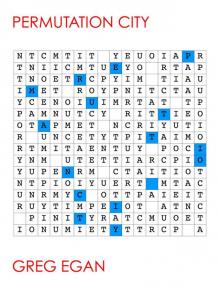 Permutation City
Permutation City The Eternal Flame
The Eternal Flame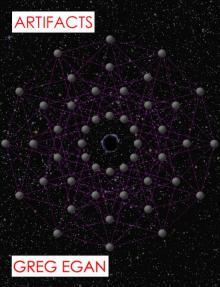 Artifacts
Artifacts Wang's Carpets
Wang's Carpets Dichronauts
Dichronauts Incandescence
Incandescence Teranesia
Teranesia Schild's Ladder
Schild's Ladder Quarantine
Quarantine The Four Thousand, the Eight Hundred
The Four Thousand, the Eight Hundred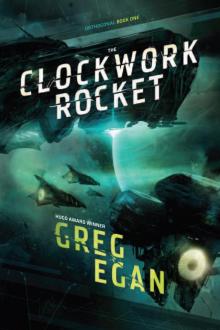 The Clockwork Rocket
The Clockwork Rocket Zeitgeber
Zeitgeber Phoresis
Phoresis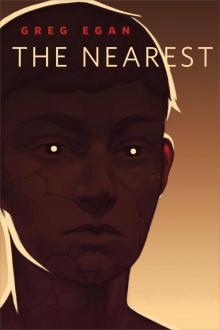 The Nearest
The Nearest Diaspora
Diaspora Instantiation
Instantiation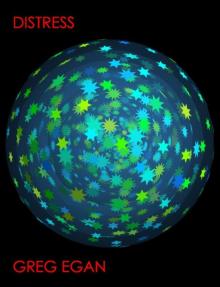 Distress
Distress An Unusual Angle
An Unusual Angle Oceanic
Oceanic The Arrows of Time
The Arrows of Time Axiomatic
Axiomatic![Anthology 2. Luminous [1998, 2010] Read online](http://i1.bookreadfree.com/i/03/18/anthology_2_luminous_1998_2010_preview.jpg) Anthology 2. Luminous [1998, 2010]
Anthology 2. Luminous [1998, 2010] Perihelion Summer
Perihelion Summer Luminous
Luminous